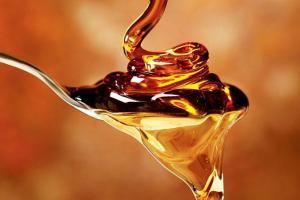The CSE study revealed that almost all the brands of honey being sold in Indian markets are adulterated with sugar syrup as 77 per cent of samples in the tests were found adulterated

Picture used for representational purpose only
Several leading honey brands sold in India have failed adulteration tests in Germany, an investigation by the Centre for Science and Environment (CSE) claimed on Wednesday.
The CSE study revealed that almost all the brands of honey being sold in Indian markets are adulterated with sugar syrup as 77 per cent of samples in the tests were found adulterated.
ADVERTISEMENT
Honey samples from leading brands such as Dabur, Patanjali, Baidyanath, Zandu, Hitkari and Apis Himalaya, all failed the Nuclear Magnetic Resonance (NMR) laboratory tests currently being used globally to check for modified sugar syrups, the CSE said.
Only three out of the 13 brands - Saffola, Markfed Sohna and Nature's Nectar (one out of two samples) -- passed all the tests, it added.
For the study, CSE food researchers selected 13 top and smaller brands of processed and raw honey being sold in India. Samples of these brands were first tested at the Centre for Analysis and Learning in Livestock and Food (CALF) at the National Dairy Development Board (NDDB) in Gujarat.
Almost all the top brands (except Apis Himalaya) passed the tests of purity, while a few smaller brands failed the tests to detect C4 sugar - call it basic adulteration using cane sugar.
But when the same brands were tested using Nuclear Magnetic Resonance (NMR), almost all big and small brands failed.
Out of the 13 brands tested, only three passed the NMR test, which was conducted by a specialised laboratory in Germany.
"It is a food fraud more nefarious and more sophisticated than what we found in our 2003 and 2006 investigations into soft drinks; more damaging to our health than perhaps anything that we have found till now - keeping in mind the fact that we are still fighting against a killer Covid-19 pandemic with our backs to the wall," said CSE Director General Sunita Narain.
"This overuse of sugar in our diet will make it worse," she added.
The samples were purchased during August-November 2020 from retail stores in Delhi and major online platforms.
More importantly, the study revealed that Indian standards for honey purity cannot detect the adulteration. This is because Chinese companies have designed sugar syrups to bypass these standards, the CSE said.
Keep scrolling to read more news
Catch up on all the latest Crime, National, International and Hatke news here. Also download the new mid-day Android and iOS apps to get latest updates.
Mid-Day is now on Telegram. Click here to join our channel (@middayinfomedialtd) and stay updated with the latest news
This story has been sourced from a third party syndicated feed, agencies. Mid-day accepts no responsibility or liability for its dependability, trustworthiness, reliability and data of the text. Mid-day management/mid-day.com reserves the sole right to alter, delete or remove (without notice) the content in its absolute discretion for any reason whatsoever
 Subscribe today by clicking the link and stay updated with the latest news!" Click here!
Subscribe today by clicking the link and stay updated with the latest news!" Click here!







